
Evolving Brains, Emerging Gods
Early Humans and the Origins of Religion
by E. Fuller Torrey
This title was previously available on NetGalley and is now archived.
Send NetGalley books directly to your Kindle or Kindle app
1
To read on a Kindle or Kindle app, please add kindle@netgalley.com as an approved email address to receive files in your Amazon account. Click here for step-by-step instructions.
2
Also find your Kindle email address within your Amazon account, and enter it here.
Pub Date Sep 05 2017 | Archive Date Oct 24 2017
Description
Based on an idea originally proposed by Charles Darwin, Torrey marshals evidence that the emergence of gods was an incidental consequence of several evolutionary factors. Using data ranging from ancient skulls and artifacts to brain imaging, primatology, and child development studies, this book traces how new cognitive abilities gave rise to new behaviors. For instance, autobiographical memory, the ability to project ourselves backward and forward in time, gave Homo sapiens a competitive advantage. However, it also led to comprehension of mortality, spurring belief in an alternative to death. Torrey details the neurobiological sequence that explains why the gods appeared when they did, connecting archaeological findings including clothing, art, farming, and urbanization to cognitive developments. This book does not dismiss belief but rather presents religious belief as an inevitable outcome of brain evolution. Providing clear and accessible explanations of evolutionary neuroscience, Evolving Brains, Emerging Gods will shed new light on the mechanics of our deepest mysteries.
A Note From the Publisher
Advance Praise
“A unique scholarly approach to the subject that is sure to be influential and highly regarded.”
—Robert Sapolsky, John A. and Cynthia Fry Gunn Professor of Biology, Neurology, and Neurosurgery, Stanford University
Available Editions
| EDITION | Other Format |
| ISBN | 9780231183369 |
| PRICE | $120.00 (USD) |
Average rating from 13 members
Featured Reviews
 catherine h, Reviewer
catherine h, Reviewer
Fascinating look into the development of the human brain and religion. I'm not a religious person, but I can see how we created gods to sooth ourselves. When you think about it, we are the gods we created. We use religion, and membership in any given religion, as much as a group networking group and alliance of community, as a worshipping of a god, or gods. I think this book could have appeal to anyone interested in human development. I'm also not entirely convinced animals aren't sentinent and capable of imagining another's wants, needs, feelings, etc... I'm not convinced anyone can measure that in non-humans.
 Maria Grazia B, Book Trade Professional
Maria Grazia B, Book Trade Professional
A really interesting text for those who want to deepen some aspects of human evolution. The first part of the book is perhaps a little difficult for those who, like me, do not have a specific preparation on the structure of the brain, although the author has clearly made every effort to explain an extremely difficult subject which, in part, is still not completely understood. The second part, however, is much simpler and very enlightening. The author rightly gives no answer to the possible question: was God out there, ready to manifest himself when man was ready to understand him, or did he emerge from the human brain, being therefore a creature and not a creator? Well, this is a matter of faith and, as I said, the author refrains. Whatever the truth may be (which we do not and cannot know), some facts are set out with linear clarity: 40,000 years ago human evolution had reached a stage where it was able to contemplate the transcendent (a time which, curiously enough, coincides with the biblical reckoning on the creation of the world) and this transcendent has taken on the same characteristics everywhere in the world, although it has 'manifested' itself separately, due to the scarcity of population and distances. Identical characteristics, albeit with different personifications, from a single god to several of those in charge of the most minute aspects of personal, social and political life in the various societies. This should lead to serious reflection on religions, which are nothing more than 'local' aspects of the mind turned to a god, and on the fact that the gods they lose are destined for museums instead of altars.
Readers who liked this book also liked:
We Are Bookish
General Fiction (Adult), Romance











